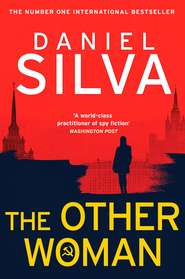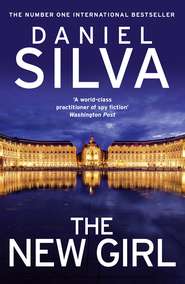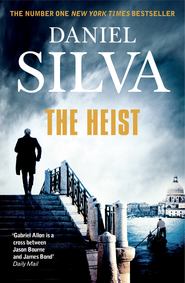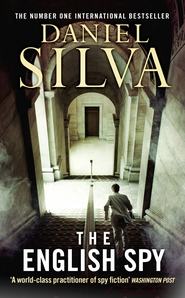По всем вопросам обращайтесь на: info@litportal.ru
(©) 2003-2024.
✖
Daniel Silva 2-Book Thriller Collection: Portrait of a Spy, The Fallen Angel
Настройки чтения
Размер шрифта
Высота строк
Поля
“Any what?”
“Politics.”
“I am a citizen of Saudi Arabia,” Nadia said. “We have a king, not politics. Besides, in the Middle East, politics can be very dangerous.”
“Was your father killed because of politics?” Zoe asked cautiously.
Nadia turned and gazed at Zoe. “I don’t know why my father was killed. I’m not sure anyone does, other than his murderers, of course.”
A heavy silence fell between them. It was broken a few seconds later by the sound of a door opening. A pair of waiters entered, bearing trays of coffee and pastries. They were followed by Rafiq al-Kamal, the chief of security, and Madame Dubois, who was tapping the face of her Cartier wristwatch as if to say the meeting had gone on long enough. Zoe feared Nadia might latch onto the signal as an excuse to take her leave. Instead, she ordered the intruders from the room with an imperious wave of her hand. She did the same for the waiter holding the tray of pastries, but accepted the coffee. She drank it black with an extraordinary amount of sugar.
“Are these the kinds of questions you propose to ask me on camera? Questions about the rights of women in Saudi Arabia? Questions about the death of my father?”
“We don’t divulge the questions in advance of an interview.”
“Come, come, Zoe. We both know how this works.”
Zoe made a brief show of thought. “If I failed to ask you about your father, I would be brought up on charges of journalistic malpractice. It makes you a deeply compelling figure.”
“What it makes me is a woman without a father.” Nadia removed a packet of Virginia Slims from her handbag and ignited one with a rather ordinary-looking gold lighter.
“You were there that night in Cannes?”
“I was,” said Nadia. “One minute we were all enjoying a wonderful evening in our favorite restaurant. The next I was holding my father as he lay dying in the street.”
“You saw the men who killed him?”
“There were two,” she said, nodding her head. “They rode motorcycles, very fast, very skillfully. At first, I thought they were just French boys having a bit of fun on a warm summer night. Then I saw the weapons. They were obviously professionals.” She drew on her cigarette and exhaled a slender stream of smoke toward the ceiling. “After that, everything is a blur.”
“There were reports that witnesses heard you screaming for revenge.”
“I’m afraid that retribution is the Bedouin way,” Nadia said sadly. “I suppose it runs in my blood.”
“You admired your father,” Zoe pressed.
“I did,” Nadia said.
“He was an art collector.”
“A voracious one.”
“I understand you share your father’s passion.”
“My art collection is private,” Nadia said, reaching for her coffee.
“Not as private as you think.”
Nadia looked up sharply but said nothing.
“My sources tell me that you made an important acquisition last month. They tell me that you were the one who paid the record price for the Rothko at Christie’s in New York.”
“Your sources are mistaken, Zoe.”
“My sources are never mistaken. And they’ve told me other things about you as well. Apparently, you’re not as indifferent to the rights of women in the Islamic world as you pretend to be. You’ve quietly given millions of dollars to combat violence against women and millions more to promote female entrepreneurship, which you believe will have the effect of empowering Muslim women as never before. But your charitable works don’t stop there. I’m told you’ve used your fortune to promote free and independent media in the Arab world. You’ve also attempted to counter the spread of dangerous Wahhabi ideology by donating to organizations that promote a more tolerant version of Islam.” Zoe paused. “Taken together, your activities paint a portrait of a courageous woman who is singlehandedly trying to change the face of the modern Middle East.”
Nadia managed a dismissive smile. “It’s an intriguing story,” she said after a moment. “It’s a shame none of it is true.”
“That’s too bad,” Zoe replied, “because there are people who would like to help you.”
“What sort of people?”
“People of discretion.”
“In the Middle East, people of discretion are either spies or terrorists.”
“I can assure you they’re not terrorists.”
“So they must be spies then.”
“I wasn’t told their affiliation.”
Nadia gave her a skeptical look. Zoe held out a card. It had no name, only the number of her BlackBerry.
“This is my private number. It is important that you proceed with caution. As you know, there are people around you who do not share your goal of changing the Islamic world for the better—including your own bodyguards.”
“What is your interest in this matter, Zoe?”
“I have no interest, other than obtaining an interview with a woman I greatly admire.”
Nadia hesitated. Then she accepted the card and slipped it into her handbag. At that instant, the door of the hotel suite opened again and Madame Dubois entered with Rafiq al-Kamal at her side. She was once again tapping her wristwatch. This time, Nadia rose. Looking suddenly fatigued, she extended her hand toward Zoe.
“I’m not sure I’m ready to lift the veil just yet,” she said, “but I’d like some time to consider your offer. Would it be possible for you to remain in Paris for a few days?”
“It will be a terrible hardship,” Zoe said jokingly, “but I’ll try to manage.”
Nadia released Zoe’s hand and followed her security chief into the corridor. Zoe remained behind for a moment longer before returning to her room three floors below. There she powered on her BlackBerry and called her producer in New York to explain that she would be staying on in Paris to continue the negotiations. Then she placed the BlackBerry on the bedside table and sat for a long time at the end of her bed. She smelled jasmine and lavender, the scent of Nadia, and recalled the instant of their parting. Nadia’s hand had been oddly cold to the touch. It was the hand of fear, thought Zoe. The hand of death.
Chapter 25 Seraincourt, France (#ulink_cbdf79b2-5ecc-5c30-96af-7865fcf98046)
ZOE’S CALL TO NEW YORK sounded in the high-ceilinged rooms of Château Treville like a fanfare of trumpets. Gabriel responded by immediately dispatching a secure cable to Adrian Carter, whereupon AAB Holdings and its owner, Nadia al-Bakari, became the target of NSA surveillance. It meant that Carter now knew the name of the wealthy Muslim with unimpeachable jihadist credentials whom Gabriel wanted to fund Rashid’s network. It also meant that, at any given moment, several dozen other members of the sprawling American intelligence community knew it, too. It was a risk Gabriel had no choice but to take. Israel’s signals intelligence service was formidable, but its capabilities paled in comparison to those of the NSA. America’s mastery of the digital world was unrivaled. It was the human factor—the ability to recruit spies and to penetrate the courts of their enemies—that eluded the Americans, and for that they had turned to the Office.
At Gabriel’s request, Carter went to great lengths to conceal Nadia’s name from the rest of official Washington. Despite the obvious potential implications for American-Saudi relations, he neglected to mention it to either the president or James McKenna at the weekly White House counterterrorism meeting. He also took care to safeguard the identity of the party who would be reviewing the NSA intercepts. They were sent first to Carter’s personal attention at Langley and then routed to the CIA station in Paris. The deputy chief, a man who owed his career to Carter, drove them personally to the grand manor house at Seraincourt, where they were signed over to Sarah Bancroft. Of particular interest to Gabriel and the team was the telephone and e-mail account of Rafiq al-Kamal, Nadia’s chief of security. Despite numerous calls placed to contacts inside the Saudi GID and Interior Ministry, al-Kamal never once mentioned the name Zoe Reed. That was not true, however, of Madame Dubois, who spent much of the next seventy-two hours burning up the lines between Paris and London, searching for dirt and gossip in Zoe’s professional past. Gabriel took this as an encouraging sign. It meant that, as far as AAB was concerned, the investigative reporter from CNBC was a public-relations problem, not a security threat.
Zoe remained blissfully unaware of the intrigue swirling around her. Following Gabriel’s carefully prepared script, she refrained from further contact with AAB or its employees. To help fill the empty hours, she visited museums and took long walks along the Seine, which allowed Eli Lavon and the rest of the field operatives to determine that she was free of any surveillance. As two more days slipped past with no word from Nadia, Zoe’s producer in New York began to grow impatient. “I want you back in the States on Monday at the latest,” he told her by telephone, “with or without the exclusive. It’s simply a question of money. Nadia has barrels full of it. We’re pinching every penny.”
The call darkened the mood at the Seraincourt safe house, as did the speech given by the French president that afternoon to an emergency session of the National Assembly. “It is not a question of whether France will be attacked by terrorists again,” the president warned, “but only a question of when and where. It is a sad fact that more lives will be lost to the fires of extremism. Regrettably, this is what it means to be a citizen of Europe in the twenty-first century.”
A few minutes after the speech ended, a message arrived from the Operations Desk at King Saul Boulevard. It was just four characters in length—two letters followed by two numbers—but its meaning was unambiguous. God was cooling his heels in a Montmartre safe flat. And God wanted a word with Gabriel in private.











